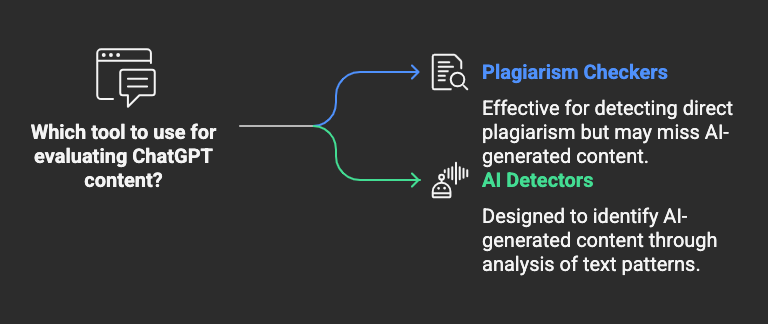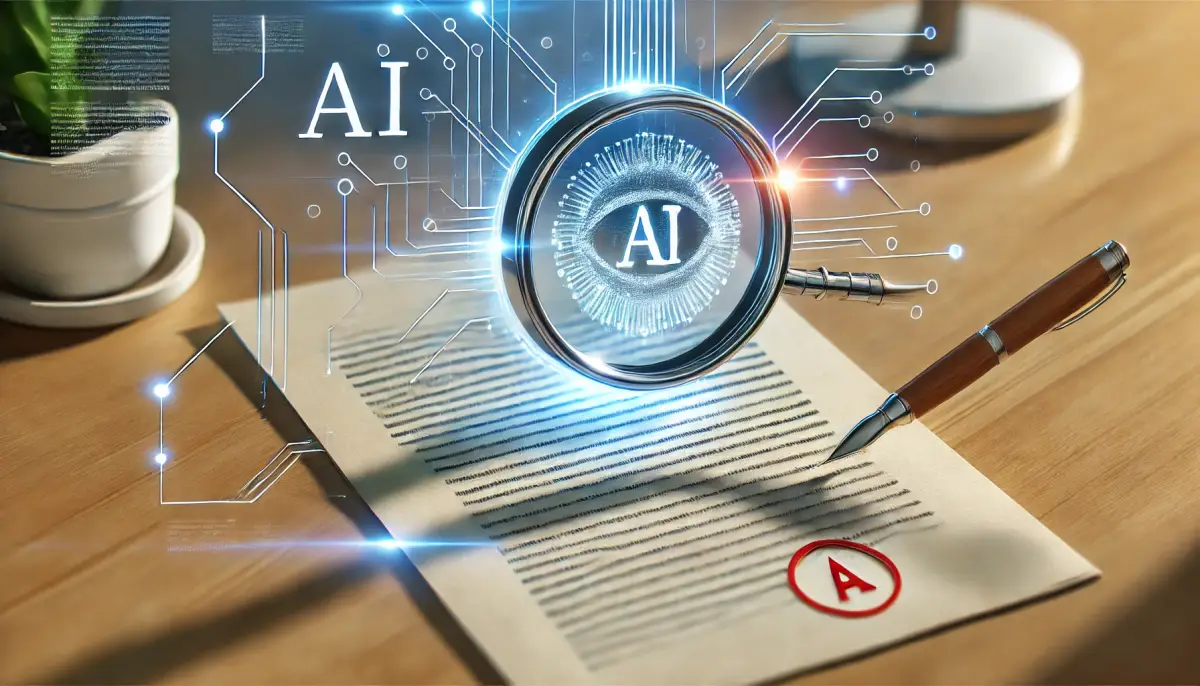Introduction
With the rise of ChatGPT, content creation has become faster and easier across academic, professional, and creative fields. But this has also sparked a growing concern: Does ChatGPT show up as plagiarism?
Many people wonder whether AI-generated content can be detected and flagged for plagiarism. Since ChatGPT creates responses based on patterns it has learned, the line between originality and plagiarism isn’t always clear.
Does ChatGPT Plagiarize?
Understanding How ChatGPT Generates Content
ChatGPT works by using a generative AI model trained on massive amounts of data, including books, articles, and websites. It predicts and generates text based on the input provided by the user.
However, does ChatGPT plagiarize? Not really. Instead of copying text word-for-word, it uses learned patterns to generate unique responses each time. But, since it draws from vast datasets, there’s a chance that it might create content that resembles existing material.
Why ChatGPT Content May Resemble Plagiarism
Even though ChatGPT doesn’t intentionally plagiarize, there are still a few reasons why its content may get flagged:
- Borrowing Ideas Without Attribution: ChatGPT may unknowingly incorporate ideas or phrasing from existing works without citing sources. This can lead to chatgpt plagiarism concerns.
- Paraphrasing Risks: When rephrasing existing content, ChatGPT’s version might be similar enough to be flagged by a plagiarism checker.
- Similarity to Published Content: AI models trained on massive datasets may produce content that mirrors publicly available material, causing it to appear plagiarized.
This raises the question: “Does ChatGPT get plagiarism?” The answer depends on how the content is generated and how closely it matches existing sources.
Can AI Detection Tools Identify ChatGPT Content?
Popular AI and Plagiarism Detection Tools
AI detection tools are improving at identifying AI-generated content. Here are some of the most widely used tools:
- Turnitin Originality AI Detector: Turnitin claims to detect 97% of ChatGPT content, but the company emphasizes treating flagged content as an indication, not definitive proof.
- Winston AI: Known for its 99% accuracy in identifying AI-generated content, Winston AI even analyzes PDFs and image files.
- GPTZero and ZeroGPT: These tools analyze sentence patterns and word structures to determine if content was generated by AI. However, results can vary depending on the complexity of the text.
Does ChatGPT Show Up on Plagiarism Checkers?
A common concern is whether ChatGPT content shows up as plagiarism when checked through popular plagiarism tools like Turnitin or Grammarly.
While these platforms are equipped to detect AI-generated content, they don’t always catch everything. Can plagiarism checker detect ChatGPT? Yes, but the accuracy depends on the sophistication of the tool and how closely the AI-generated content resembles existing materials.
Can ChatGPT Detect Plagiarism?
Can ChatGPT check for plagiarism? No, ChatGPT itself cannot detect plagiarism or compare its responses to existing content.
However, users can use external ChatGPT plagiarism checkers to analyze AI-generated content for similarities. Tools like Turnitin, Winston AI, and Copyleaks can help identify and assess the originality of ChatGPT responses.
Is Using ChatGPT Considered Plagiarism?
Ethical Perspective: Is ChatGPT Plagiarism?
Is using ChatGPT plagiarism? It depends on how the content is used. Plagiarism traditionally means presenting someone else’s work as your own without credit. Since ChatGPT is not a human author, some argue that AI-generated content falls into a gray area.
If you’re using ChatGPT to brainstorm ideas or refine content that you heavily edit, it’s not plagiarism. But copying ChatGPT content verbatim without acknowledgment can raise ethical concerns.
Institutional Guidelines on ChatGPT Use
Many academic and professional institutions now have guidelines on using ChatGPT. Organizations like APA and MLA recommend citing ChatGPT just like any other source.
If you’re using AI-generated content in an academic or professional setting, it’s best to cite the source appropriately to maintain transparency.
How to Avoid Plagiarism When Using ChatGPT
Fact-Check and Edit Content
One of the best ways to avoid plagiarism with ChatGPT is to fact-check and edit its content. ChatGPT may generate incorrect or outdated information, so verifying the facts ensures that the final content reflects accurate information.
Properly Cite ChatGPT in Your Work
If you’re using ChatGPT content, make sure to cite it properly using APA, MLA, or other accepted citation formats. Acknowledging AI-generated content maintains ethical integrity and avoids plagiarism.
Use ChatGPT as a Writing Aid, Not a Content Generator
To stay on the safe side, use ChatGPT as a brainstorming tool or to enhance creativity. Avoid relying on it to produce complete, unedited content. Responsible AI use minimizes the risk of plagiarism and ensures that your work remains original.
How Is ChatGPT Plagiarism Detected?
Techniques Used by Plagiarism Checkers
How is ChatGPT plagiarism detected? Plagiarism checkers analyze text patterns, sentence structures, and linguistic patterns to identify similarities with existing content.
These tools use advanced algorithms to spot AI-generated text by analyzing predictability and repetition in the content.
Limitations of Current AI Detection Tools
Even though AI detection tools have improved, they’re not perfect. They sometimes produce false positives by flagging human-written content as AI-generated.
Since AI-generated content doesn’t always follow a strict formula, current detection tools may occasionally miss ChatGPT content that closely resembles original work.
Can ChatGPT Avoid Plagiarism?
Does ChatGPT Prevent Plagiarism?
Many users ask: “Does ChatGPT avoid plagiarism?” The short answer is that while ChatGPT aims to generate unique content, it doesn’t come with built-in plagiarism prevention mechanisms.
ChatGPT creates responses by predicting the most likely next word based on patterns in the vast datasets it was trained on. This means that while the content is original at the sentence level, there’s still a chance that phrases or ideas may unintentionally resemble existing content.
To be clear: ChatGPT does not intentionally plagiarize, but it’s not completely foolproof. If a user provides a prompt that mirrors existing material, the response could closely resemble previously published content, raising plagiarism with ChatGPT concerns.
So, while ChatGPT tries to avoid plagiarism by generating fresh responses, users still need to review the content for potential overlap and check for ChatGPT plagiarism to stay safe.
Best Practices for Using ChatGPT Responsibly
To avoid plagiarism when using ChatGPT, follow these simple but effective best practices:
1. Rephrase and Add Your Voice
Even if the content looks unique, rephrasing and adding your own thoughts can help ensure originality. This step reduces the risk of accidental paraphrasing.
2. Fact-Check the Content
AI models like ChatGPT occasionally generate inaccurate or outdated information. Always verify facts and ensure the content aligns with credible sources.
3. Cite ChatGPT When Necessary
If you’re using content generated by ChatGPT in academic or professional settings, cite it using formats like APA or MLA. Proper attribution eliminates ethical concerns.
4. Treat ChatGPT as a Writing Assistant
Use ChatGPT as a brainstorming tool, not a complete content generator. Does ChatGPT avoid plagiarism? Yes, when used responsibly—as a writing assistant that enhances creativity rather than replaces it.
Following these best practices ensures that you’re using ChatGPT ethically and responsibly, minimizing any risk of plagiarism.
Can ChatGPT Be Detected for Plagiarism?
Plagiarism Checkers vs. AI Detectors
It’s important to understand the difference between plagiarism checkers and AI detectors when evaluating ChatGPT content.
- Plagiarism Checkers: Tools like Turnitin and Grammarly compare text to existing content to identify similarities. However, these tools primarily detect direct plagiarism and may not always flag AI-generated content.
- AI Detectors: Tools like GPTZero, ZeroGPT, Winston AI, and Copyleaks analyze sentence patterns, text coherence, and structure to determine if content was AI-generated. These detectors are more effective at identifying ChatGPT-generated responses.
So, can ChatGPT be detected for plagiarism? Yes, but it depends on whether you’re using a traditional plagiarism checker or an AI-specific detector.

Will ChatGPT Show Up as Plagiarism?
“Will ChatGPT show up as plagiarism?” It depends on how the content is used.
If ChatGPT’s responses are left unedited and submitted as original work, plagiarism checkers may flag them as duplicate content. AI detectors, on the other hand, are more likely to identify ChatGPT content, even when rephrased.
To reduce detection risks:
- Edit and modify AI-generated content to make it unique.
- Add original insights or combine multiple sources to create a well-rounded piece.
- Run the content through a ChatGPT plagiarism checker to identify potential similarities.
By taking these steps, users can prevent ChatGPT content from being flagged and ensure that their work remains plagiarism-free.
Plagiarism with ChatGPT
Is ChatGPT Plagiarism-Proof?
A common myth is that “ChatGPT is plagiarism-proof,” but that’s not entirely true.
Since ChatGPT generates content based on patterns in its training data, it aims to create unique text. However, this does not guarantee that the content is completely original. If a response inadvertently mirrors existing material, it may be flagged by plagiarism checkers.
Does ChatGPT avoid plagiarism? Not always. It’s still essential for users to review and refine the content to ensure it meets originality standards.
Common Misunderstandings About ChatGPT and Plagiarism
Let’s clear up a few misconceptions:
“Does ChatGPT plagiarize?” – No, ChatGPT generates content from scratch, but there’s always a chance it may resemble existing material.
“Is ChatGPT plagiarism-safe?” – Not entirely. AI-generated content can be flagged if it matches published content or exhibits patterns that plagiarism checkers recognize.
“Is ChatGPT considered plagiarism?” – It depends on usage. Using AI-generated content without attribution can be considered plagiarism, especially in academic settings.
By understanding these nuances, users can use ChatGPT responsibly and avoid ethical pitfalls.
Best Tools for Checking ChatGPT Plagiarism
Here’s a quick list of the best tools for detecting ChatGPT plagiarism and AI-generated content:
1. Turnitin AI Detector
Widely trusted by academic institutions, Turnitin’s AI detector identifies ChatGPT-generated content with up to 97% accuracy.
2. Pure Textify
Pure Textify offers the best Humanizer AI tool for free! It converts AI-generated text into 100% human-like, readable content with no signup or account required.
3. Winston AI
Winston AI is known for its high accuracy in detecting AI-generated text and offers additional capabilities like scanning PDFs and images.
4. GPTZero/ZeroGPT
These tools specialize in identifying AI-generated content and continue to improve their accuracy over time.
5. Copyleaks
Copyleaks provides advanced AI content detection and plagiarism analysis, making it a reliable option for educational and professional use.
By leveraging these tools, users can check for ChatGPT plagiarism and ensure that their content meets originality standards.
Conclusion: How to Use ChatGPT Ethically Without Plagiarism
So, does ChatGPT show up as plagiarism? The answer isn’t always straightforward. While ChatGPT doesn’t directly copy content, its responses may sometimes resemble existing material closely enough to raise red flags in plagiarism checkers.
To use ChatGPT ethically and avoid plagiarism risks:
- Fact-check and edit AI-generated content to ensure accuracy and originality.
- Cite ChatGPT properly when incorporating its responses into academic or professional work.
- Use ChatGPT as a writing assistant, not a content generator, to enhance creativity without compromising integrity.
By following these best practices, users can harness the power of ChatGPT responsibly, creating unique, high-quality content while maintaining ethical standards.
FAQs: Common Questions Answered
Is ChatGPT plagiarism-proof?
No, ChatGPT generates unique content, but AI detection tools like GPTZero and Turnitin AI Detection can still flag it. Always review, edit, and personalize AI-generated text before using it.
Can plagiarism checkers detect ChatGPT?
Traditional plagiarism checkers usually do not flag ChatGPT content, but AI detection tools like Winston AI and GPTZero can recognize AI-generated text patterns.
How to catch ChatGPT plagiarism?
Use AI detection tools like Turnitin AI Detection and GPTZero to analyze text predictability. Running the content through a plagiarism checker can also verify if it closely resembles existing material.
Is copying ChatGPT plagiarism?
Yes, if you use AI-generated text verbatim without modifying it. Always rewrite, fact-check, and cite sources when necessary to maintain originality.
Will ChatGPT get flagged for plagiarism?
Yes, if the content closely resembles existing sources or follows AI-generated writing patterns. Editing AI-generated text, adding personal insights, and using plagiarism detection tools can help minimize this risk.

